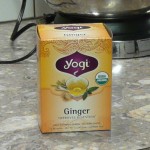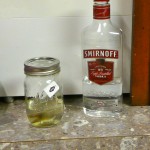 I bought some ginger tea a little while back, but it turned out a little disappointing. Despite steeping the tea for longer than the prescribed 5–10 minutes, I could barely detect any of the characteristic spicy flavor that I was expecting.
I bought some ginger tea a little while back, but it turned out a little disappointing. Despite steeping the tea for longer than the prescribed 5–10 minutes, I could barely detect any of the characteristic spicy flavor that I was expecting.
Then a few days ago I decided to give the tea another shot. While water was heating up on the stove, I stuck a teabag in a mug, and added a little milk. I don’t usually put milk in my tea, but I already knew the plain tea was going to be boring. When the teapot started whistling, I poured the boiling water onto the milk/teabag in my mug.
To my surprise, when I started sipping several minutes later, the tea was much more “gingery” than I remembered it. I had a hunch about why, so I embraced my nerdiness scientific leanings and embarked on a study to more rigorously test my hypothesis.
Hypothesis. Milk is better than water at extracting the flavor molecules from ginger tea. Ginger’s signature flavor is attributed to three important molecules (thanks Wikipedia), shown below.

These are all organic molecules, so generally speaking, they are likely to be more soluble in organic solvents than in water. Milk is mostly water, so it’s not truly an organic solvent. However, milk contains a lot of proteins and fats (both of which are organic) that could attract ginger’s flavor molecules.
In theory, ginger tea steeped in milk should taste stronger than tea steeped in plain water, with milk added later:
[TEABAG + MILK + H2O] >> [TEABAG + H2O] + MILK
Experimental Design. Two seemingly identical cups of tea (marked only on the bottoms of the cups) were prepared side-by-side. In one cup, milk was combined with hot water before adding a teabag, such that the milk would be present while the tea steeped. In the other cup, the tea was brewed in plain hot water, and milk was only added after the teabag was removed.
Tea tasting was performed by a volunteer that I managed to recruit. He was blind to the preparation method of each cup of tea, and was simply required to declare which cup (if either) had a stronger ginger flavor.
The experiment was performed in triplicate with the following types of milk: (1) whole milk, (2) skim milk, (3) Half & Half.
Results. The tea steeped in the presence of Half & Half was undeniably stronger-tasting than the normal tea in which Half & Half was added after removing the teabag. Unfortunately, using two tablespoons of Half & Half in 8 oz of tea is really disgusting regardless of preparation method.
Tea brewed in the presence of whole milk also had a stronger flavor than tea with whole milk added post-steeping, though the taste difference was more subtle compared to the Half & Half results. The volunteer taste-tester identified the milk-brewed tea as having a stronger flavor three times out of three.
Even tea steeped with skim milk tasted stronger than tea with skim added after brewing. The volunteer taste-tester identified the milk-brewed tea as having a stronger flavor four out of five times.
 Conclusions. Ginger tea steeped in the presence of milk tastes stronger than tea steeped in plain water. So if you’re going to add milk anyway, do it before brewing. This principle probably applies to other types of tea as well.
Conclusions. Ginger tea steeped in the presence of milk tastes stronger than tea steeped in plain water. So if you’re going to add milk anyway, do it before brewing. This principle probably applies to other types of tea as well.
Bonus Info: You can also make ginger vodka from ginger tea. Unsurprisingly, ethanol seems to be really good at extracting flavor molecules, because this vodka turned out very gingery.



Great post!
Will have to try the ginger vodka thing… 🙂
Love it Sharon! I made ginger soda this weekend (and thought some dark rum was in order). I wonder if you can keep the flavor extraction from ginger root and not have to simmer the vodka/rum
Ginger soda + dark rum is practically a mojito, yum! The ginger root would probably work. I helped/watched a friend brew ginger beer – he used grated ginger root during the boiling-with-hops stage, and then I think he left some root in during the month+ fermentation stage. It was good.
Ginger soda and dark rum is a Dark and Stormy.
A Mojito is made with simple syrup, lemon or lime juice, spearmint, soda water and light rum.
Gosh, it’s cold outside. I think I feel some sniffles coming on; I’ll have to try this. (For Medicinal Purposes Only, naturally.)
I find most teas are better if you use water that has not quite reached boiling point.
Awesome experiments!
I can’t speak for most teas, though the English tea I generally drink (black tea) is definitely superior when made with just boiled water than merely hot water. And adding the milk first makes it considerably worse-tasting. But those might well be due to the flavors in black tea being more efficiently extracted by the very hot water: adding milk reduces the temperature too.
I’ve also used half-and-half in tea and agree it is pretty bad.
Good point about the English tea! I am actually drinking some English black tea right now, and though I don’t have any milk here at work, I don’t think I’d want to try making this flavor any stronger anyway. I can only steep it for 2 or 3 minutes, or it gets bitter. I think the milk extraction would work well for other mildly flavored teas though, like lemon tea or mint tea, maybe chamomile.
Not a chemist, but an avid cook.. Have you tried a tiny bit of lemon oil or extract? I would think that would taste a lot better than milk and still provide the organic solvent.
Haven’t tried it, but that would definitely fit with the theme and sounds yummy. My only concern would be that the lemon oil might just float on top of the water and not really help with the extraction. Only one way to find out!
I’m delighted to see the scientific method applied to tea, especially since tea culture is generally so rife with superstition, deference to authority, and blinded by tradition.
I look forward to your next experiment!
If you’d like to see the scientific method applied to pancakes, check this out:
http://sciencegeist.net/http:/sciencegeist.net/whats-the-ph-of-your-pancakes/
Isn’t the tea cold after 7,5 minutes? Sorry, but being British the idea of drinking lukewarm milky tea is ghastly. Herbal tea should be milk free or it will be too cold. IMHO. 🙂
Haha it actually hadn’t cooled off too much – I used boiling water, but I’ll admit it was borderline. For the sake of a “scientific” experiment, I prepared the tea this way, but in practice it might work better to just microwave the whole ensemble. Also, 7.5 minutes was probably longer than necessary, but this brand of tea called for “5 to 10 minutes”, so I chose the midpoint.
Also, two tablespoons of any type of milk/cream is really too much for an 8 oz cup of tea… (the half&half creamer version was in fact “ghastly”) – this recipe does need some improvements : )